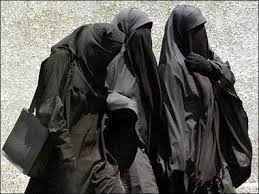Ngwentah Berlyne Ngwalem, Buea, Cameroon, SSH Blog Correspondent

Many cultures have placed inconceivable restrictions on women’s choices and bodies. I remember being told firmly and reassuringly by men that I would never see a Muslim woman who is covered get sexually harassed. Of course with the knowledge and opinion I have about harassment – that it has to do with male dominant control over women — I knew their assumptions were ignorant. But it pushed me to want to understand more about why people think women in more conservative cultures like in the Cameroonian Muslim community and Muslim cultures globally still get harassed and have their bodies and dress code choices policed, which seems to be a progressive act.

I had no idea that women who got sexually harassed while wearing a hijab could still be told that they tempted men because they were not wearing the Nijab until an Egyptian-based women and human rights defender, Angie told me this recently. I was shocked to hear of the senseless demands placed on women by society, demands that keep increasing each day.
I’ve been holding discussion sessions with many individuals hoping to understand why the subject of women’s mode of dressing is usually used as an excuse to commit crimes against them and skillfully deny them access to enjoy public freedom and safety.
A reference was made to the recent law in Saudi Arabia banning women’s “tempting eyes” as a symbol of society’s desire to someday see women disappear from the surface of the earth. What I wanted to find out was exactly what the people in my society thought of these demands placed on women bymany societies which never seems to be good enough or act as an assurance that women will be secured and free in public space. 
Knowing the thoughts of our country’s peopleabout the fact that Muslim women still get sexually harassed while fully covered is also crucial in making my point that adress code policing women in Cameroon is senseless. Women are refused access into offices, churches, Universities and it is okay to catch and jail women with the excuse that they would cause men to lose focus and think only of having sex with these women.
“Muslim men have a very high libido, way higher than that of Christian men. Muslim men cannot control themselves with the kind of extremely high libido they have, that is why Muslim women need to cover their bodies completely so that they can be safe and not be sexually harassed by their men,”one young man explained to me.

As if that was not a disturbing excuse which shows people’s lack of ability to question societal constraints placed on women for no befitting reason in many cultures- with no interest seeking to understand why these things happen mostly to women globally and join in the fight against such norms that are put in place to ensure women know no peace, another young woman said, “They get sexually harassed because though they cover their body, their faces are still exposed and since they are so pretty men get tempted by their beauty.”
There is a common believe in Cameroon that Muslim women generally are more attractive than any other race of women in the world. Muslim women both in and out of Cameroon are considered by many to have a certain facial structure which is usually long and small and considered to be a more attractive face type.
Another man explained to me that, a certain type of dressing in the Muslim culture signifies that a woman is single, so when she goes out men will likely sexually harass her because they are aware she is not married.
It is hard to explain how all the Christians I conversed with spoke of these Muslim men as if they know them so well. It is hard to comprehend how Cameroonians will condemn women for not dressing well as a reason they are sexually harassed. 
I was demoralized at the fact that most peoples’ responses just seemed to be making excuses for men except for one man who thought differently about harassment in the Muslim community being a symbol of masculine dominance. As he opines, “Muslim women still get street/sexually harassed because Muslim men believe that women were created for their pleasure so they assume they have full control over them.”
I was at least relieved that there was one person amongst the groups of people I spoke to who did not blame women for being the cause of their sexual harassment in public places.
Berlyne is a Cameroonian-based women’s human rights activist, passionate and determined to put an end to social injustice of any kind. You can find her on twitter @Luvequalityrule and Facebook.
